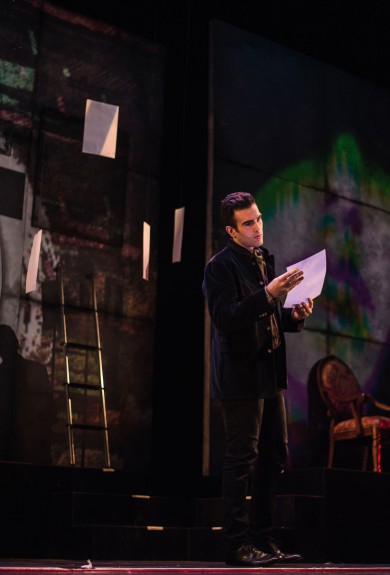03 Jul Miami Music Festival Les Contes d’Hoffmann Review
Young singers serve up a delightful “Hoffmann” at Miami Music Festival
Jacques Offenbach’s The Tales of Hoffmann has long been an operatic conundrum. Left in partial disarray at the composer’s death prior to the 1881 premiere, the score has been produced in editions by numerous arrangers and musicologists. The Miami Music Festival utilized the version that held the stage for most of the 20th century with recitatives and orchestrations by Ernest Giraud and a revised Venetian act by Andre Bloch.
An inventive production with a remarkably talented cast of vocal students was wildly cheered by Thursday’s opening night audience at Barry University’s Broad Performing Arts Center.
The opera’s three acts form the poet’s Hoffmann’s recollections of his tragic infatuation with three women–a courtesan, an opera singer and a mechanical doll. Based on short stories by the writer and composer E.T.A. Hoffmann, these tales have more than a touch of the macabre. Offenbach’s vocal writing is demanding, particularly for the tenor in the title role.
The obviously well coached and thoroughly rehearsed young cast rose to the challenge with admirable security and aplomb.
Roy Hage was an ardent Hoffman. His lyric tenor was free of strain in the top range and he artfully conserved his vocal resources for the big moments throughout the protagonist’s long and taxing role. Hage brought special fervor and tonal richness to the duet with Jordan Stadvec as Antonia.
As his nemesis in the villain triple roles of Coppélius, Dr. Miracle and Dapertutto, Fort Lauderdale native Ryan Hill was the personification of evil. As Miracle who urges the ailing Antonia (who is wheelchair bound in this production) to sing to her death, he was downright scary. An alum of the University of Miami’s Frost Opera Theater, Hill brought a deep and voluminous baritone to the three Mephistophelian characters.
Corey McGee was a dapper and brutal Lindorf and dignified Crespel, his dark tinged bass-baritone a scene stealer. With Hage, Hill and McGee singing at full power, the superb trio in the Antonia scene was one of the evening’s highlights.
The three ladies of Hoffmann’s stories were no less impressive. As Olympia, Marcela Peñaranda was a petite dancing doll with the coloratura chops and spot-on articulation to spin roulades into the stratosphere. In this production Olympia was powered by electric charge rather than wound up, making Peñaranda’s movements even funnier as the automaton’s power ran down.
Christina Boosahda brought glamour and an opulent and colorful soprano to the Venetian courtesan Giulietta. (The Venetian act was the centerpiece of the staging rather than the final vignette which was Offenbach’s original intention and recent productions have restored.)
Stadvec, the spunky Musetta of last summer’s Miami Music Festival production of La Bohème, was the passionate and expressive Antonia. Some initial harshness quickly disappeared as Stadvec’s voice blossomed. Her death scene was riveting as she sang with the apparition of her dead mother, here sung onstage in lustrous tones by Mengtao Zhou.
As Hoffmann’s companion Niklausse, Megan Moore mixed theatrical spark and attractive mezzo timbre for a winning characterization. Her arias were stylishly delivered and her hilarious impersonation of the doll Olympia drew laughter and applause.
Ehimemen Omigie’s agile character tenor and comedic timing turned Spalanzani, the doll’s inventor, into a real personality. Cleveland O’Neal was genuinely funny as Frantz, Crespel’s deaf servant. With a fine tenor and deft articulation, O’Neal brought sympathy to a role usually rendered as a slapstick caricature. Benjamin Croen, Alejandro Viera and Peter Rivera offered strong support in other roles.
Caren Levine led a well paced, nuanced performance that gave equal measure to the score’s drama and melodic richness. A few brass burbles aside, the responsive student orchestra played with security and tonal heft. Under Frost Opera alum Jared Peroune, the female and male chorus was strong and robust.
Jennifer Williams’ consistently imaginative production made a virtue of the theater’s small stage with characters entering through openings in the set. The crowd in Luther’s tavern (in the prologue and epilogue) were more ruffians than students having a good time. Patricia Hibbert’s handsome and multihued costumes and Yuki Izumihara’s clever unit set were enhanced by Yee Eun Nam’s projections of Spalanzani’s machines, Hoffmann’s stolen image and Miracle’s sinister medical positions in the manner of a horror movie. The entire staging was imaginative, thoughtfully conceived and greatly entertaining.




No Comments